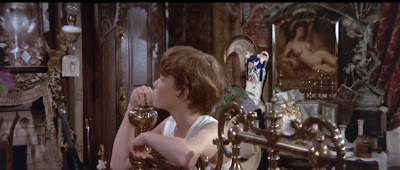I was watching an old Steve McQueen movie the other day called The Reivers based on a William Faulkner novel. The story concerns a lively fellow, naturally played by McQueen, who "borrows" an auto–-and the auto owner's 11 year-old grandson–-for a trip that will open the eyes of the young man and teach him all about life. It's one of those coming-of-age type movies that were popular in the late 60's and early '70's. The story is set in the first decade of the 20th Century in Memphis, Tennessee.
One of the main sections of the movie takes place in a brothel where McQueen has a girlfriend he wishes to marry. When he arrives at the brothel door we know instantly we're in a house of ill repute because the door is answered by an elderly woman with a little too much makeup and jewlery, and the surroundings just drip with gaudy color, shiny brass and decadence. Now, mind you, this movie was filmed in 1969 so what we're actually seeing is the set director's idea of 1910 gaudy decor.
A prominent cobalt blue art nouveau floral majolica vase sits on a table in one of the bedrooms. It could be French, Austrian or Bohemian.
It reminds us that for a very long time majolica was generally considered gaudy, tasteless, and the epitome of bad taste, and 1969 was on the tail end of that period. Of course today no serious antique collector or dealer would share that feeling, but 1969 was a very different time.
It reminds me of the lyrics to an old Pete Seeger song made popular by the Byrds just a few years before the movie, To Everything ,Turn, Turn, Turn, There is a season Turn, Turn, Turn, And a time to every purpose, under Heaven.
To view The Reivers trailer go here.



No comments:
Post a Comment